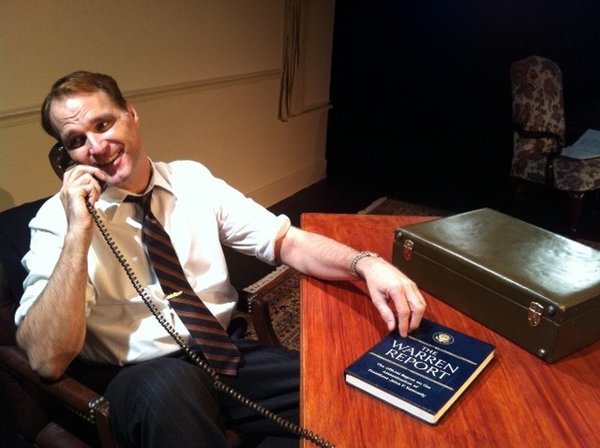
Is it enough to gesture towards a tragedy to inherit its pathos? Surely, the answer doesn’t matter much—the effort must still be made. To do otherwise would be irresponsible. Thus: ROSEBURG, directed by Ginger Dayle and written with the assistance of the cast, a self-professed incomplete play-in-progress about gun violence in America.
Two stories retold in parallel structure—the 1968 assassination of Robert F. Kennedy (Russ Widdall) and the 2015 Umpqua Community College shooting—offer the complementary stories of RFK and a mass shooter (Jackie DiFernando) in alternating scenes, as they trudge inexorably along towards the twin conclusion we all know to be inevitable. It’s proper classical tragedy, replete with hamartia and a Greek chorus, a flexible resource, flowing comfortably from the combined voice of a grief counseling session, to the disembodied messages of a chat room, to protesters at a political rally, but always a distressing, disorienting force for the lone actor set apart.
There’s an upstage screen, too, periodically coming alive with news reports, NRA advertisements, reactions to shootings, archival footage for a litany of events you probably tried to forget. It’s used well here, set between or behind live scenes, and the inherent dehumanizing effect of the screen is emphasized to the point of discomfort, particularly for the RFK assassination, never portrayed on stage. Instead, an AV presentation, news reporters and funeral footage. Because of course, Bobby didn’t die in real life, in front of us, on stage. He died on TV.
And man, does he ever approach death dutifully, indulging lustily in the premonitions of doom, dialogue peppered with knowing winks to the audience, warning of fatal mistakes and paths to destruction in the political choices of the campaign trail. They’re fun, more than anything, though the ominous tone of the scenes make it hard to tell if they’re intended to be sincerely troubling or merely to bring some levity to a fairly dense dough.
Truly, the grim hand-in-hand march, RFK and shooter, ever-onwards to oblivion would be terribly compelling narrative structure if there were some urgency to the pacing. ROSEBURG is pockmarked with unnecessary and under-edited scenes; it has a running time of 2 hours and 45 minutes that feels even longer. There’s an unwelcome generosity of time here, the extended relitigation of over-common gun control talking points serves little purpose but introduce us to the familiar: the horror of gun violence, the role guns can play in family bonding, the propensity in this conversation to talk past one another. Little more is mustered to this conversation than, yes, we too feel the confusion you feel.
In those inflection points where the play does summon together the wherewithal to progress, the play has a tendency to come across as trite. Towards the climax, the shooter addresses the audience directly, an indictment of their voyeurism and the glorification of infamy. It’s a familiar and troubling criticism. One expects, in this play about gun violence, some further attempt to explain or address the phenomenon. And yet nothing comes. The shooting is too tantalizingly close to engage in exploration, at the very moment it’s most desired. Perhaps it’s unfair to expect a major breakthrough on the question of gun violence in this play. But, of course, the question, then why are we here? Have we done anything save further the exposure of the shooter? Is this hypocrisy? Yes. Yes, of course it is.
ROSEBURG’s final scene, after the death of RFK and nine students in Oregon, and the re-enacted testimonials of survivors, provides a summation and a forward-looking program for the future: do something.
Roseburg’s failing is not that it’s exploitative or hypocritical. Compelling art can be both. Roseburg’s failing is that it has nothing to say.
[Adrienne Theatre Second Stage, 2030 Sansom Street] July 7-31, 2016; newcitystage.org.
